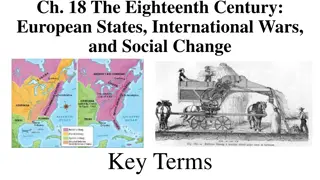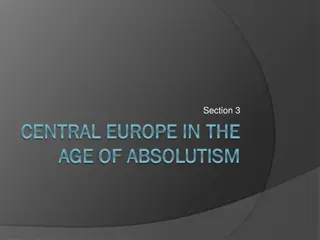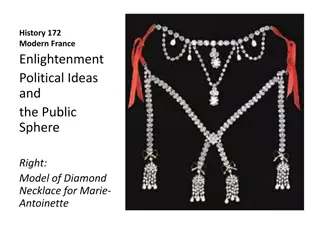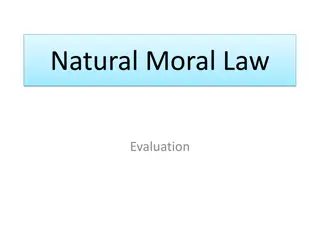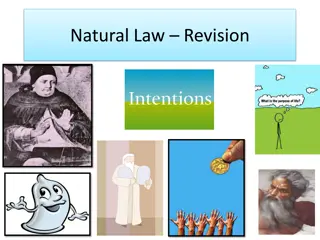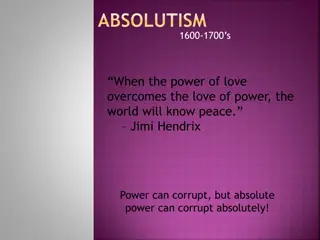Exploring Ethics: Branches, Theories, and Moral Dilemmas
Ethics delve into Meta Ethics, Normative Ethics, and Applied Ethics to understand moral concepts and decision-making. The discourse covers various ethical theories like Absolutism, Relativism, Subjectivism, and explores the difference between Teleological and Deontological decision-making. Thought-p
5 views • 14 slides
Understanding Liberalism: Key Ideas and Historical Context
Liberalism, a prominent political ideology, emerged in the 19th century and is closely linked to capitalism. It stands against absolutism and feudal privileges, advocating for individualism, freedom, reason, equality, toleration, consent, and constitutionalism. The evolution of liberalism emphasized
1 views • 18 slides
European Enlightenment and Social Changes in the 18th Century
The 18th century witnessed significant changes in European states, marked by the emergence of natural laws, natural rights, and enlightened absolutism. Concepts such as patronage, balance of power, and primogeniture also played pivotal roles. The era saw the implementation of reason of state and the
0 views • 13 slides
Central Europe in the Age of Absolutism: Habsburgs and Hohenzollerns
Habsburg Austria lost and acquired territories, Maria Theresa inherited lands with the Pragmatic Sanction, leading to a diverse Hapsburg Empire. The rise of the Hohenzollerns in Brandenburg-Prussia saw Frederick William and Frederick the Great consolidating power through military and administrative
3 views • 13 slides
Enlightenment Philosophers and Their Influence on the French Revolution
The French Revolution was influenced by Enlightenment philosophers like Thomas Hobbes, Rousseau, Voltaire, and Montesquieu. Their ideas on social contracts, collective sovereignty, enlightened absolutism, and the need for checks and balances challenged the traditional Ancien Régime's feudalism, pri
0 views • 26 slides
Enlightenment Political Ideas in Modern France
The Enlightenment era in Modern France brought forth significant political ideas and discussions, including Thomas Hobbes' concept of social contract and Rousseau's emphasis on collective sovereignty. Montesquieu advocated for checks-and-balances in government, while Voltaire promoted enlightened ab
0 views • 21 slides
Evaluation of Natural Moral Law: Absolutism, Relativism, and Ethical Considerations
The evaluation of Natural Moral Law explores the contrast between relativism and absolutism, highlighting the advantages and disadvantages of a deontological approach. It discusses how NML provides universal moral truths, clear answers in times of uncertainty, and sets boundaries for ethical behavio
0 views • 22 slides
Warm-Up Activities for History Class
Engage students with daily warm-up exercises focusing on historical concepts and critical thinking questions. Topics include world history, leadership qualities, Divine Right, Peter the Great, Absolutism, and Louis XIV. Each warm-up encourages reflection, analysis, and discussion to enhance learning
0 views • 12 slides
The Golden Temple: A Symbol of Sikh Sovereignty and Universal Culture
Mutual contacts in Sikh history have left monuments of bigotry, yet the Golden Temple stands as a symbol of universal culture and a meeting ground for all. Grounded in Sikh doctrine, it represents a stance against absolutism and serves as the hub of the Sikh world, embodying the principles of respec
0 views • 11 slides
Religious and Social Conflicts Fueling the Rise of Absolutism in Europe
Social, economic, and religious conflicts in Europe played a significant role in the emergence of absolutism where monarchs wielded supreme power without sharing it with legislative bodies. Events like Spain's religious conflicts, Protestantism in England, the Spanish Armada, religious conflict in t
0 views • 10 slides
Understanding Natural Law Theory: Aquinas's Perspective
Natural Law Theory, influenced by Aristotle and Christian ethics, asserts that there are universal norms based on intrinsic goodness. Aquinas emphasized the importance of human rationality, linking reason to moral precepts and virtues. The theory promotes the idea of a final purpose for humans and t
0 views • 20 slides
The Enlightenment and Absolutism: Key Concepts and Figures
The period saw significant developments, including the Scientific Revolution emphasizing reason and systematic observation, leading to the expansion of scientific knowledge. Absolutism showcased monarchs' control, like Peter the Great's westernization of Russia and Louis XIV's Palace of Versailles.
0 views • 22 slides
Rise and Fall of Absolutism: A Glimpse into 17th-Century Monarchy
Explore the era of Absolutism (1600-1700s) where rulers wielded absolute power, influenced by divine right beliefs. Focusing on Louis XIV of France, known as the Sun King, who shaped France's destiny through extravagant projects like the Palace of Versailles. However, challenges to absolute rule eme
0 views • 17 slides


